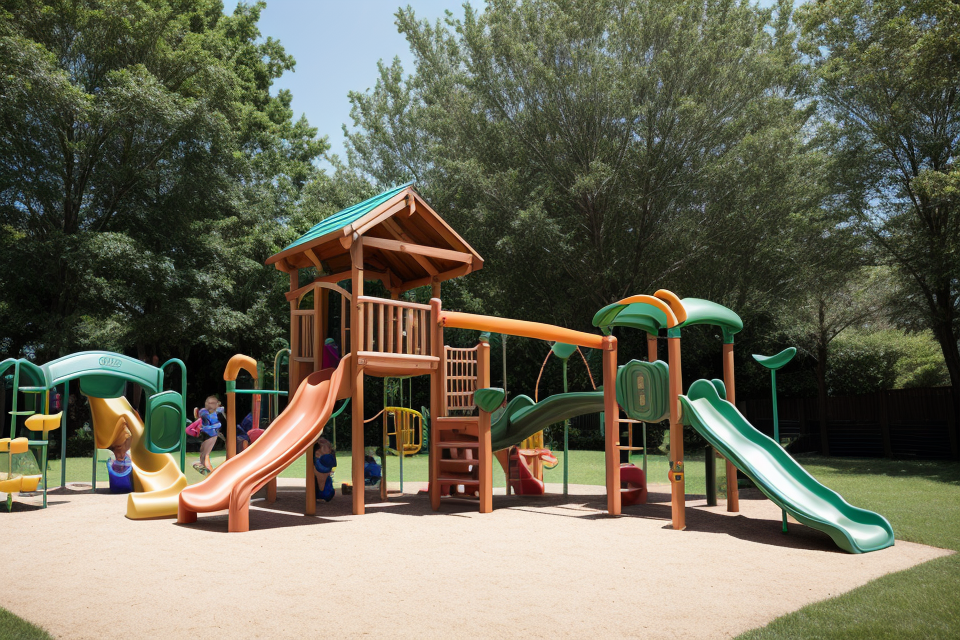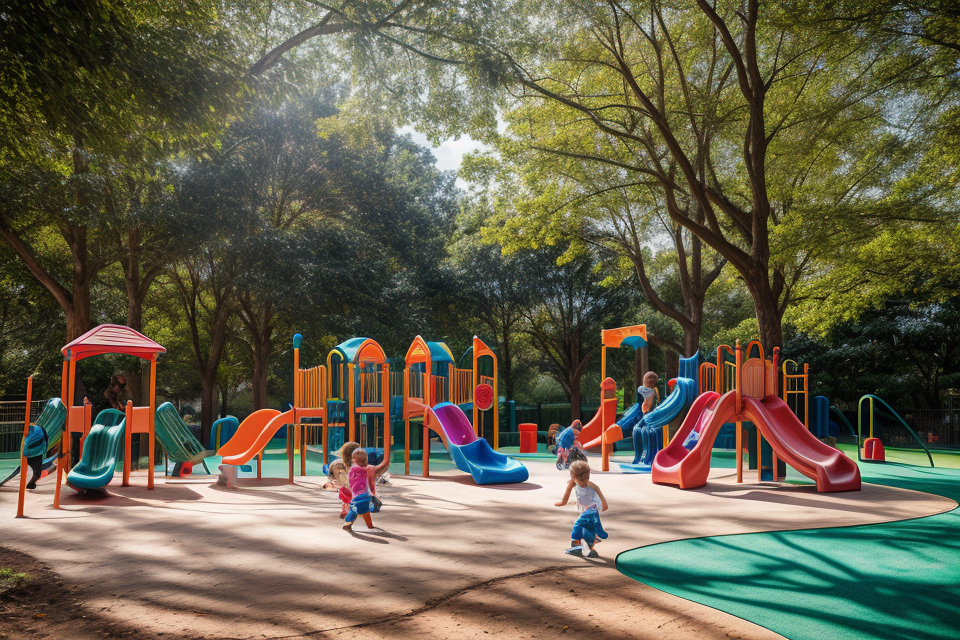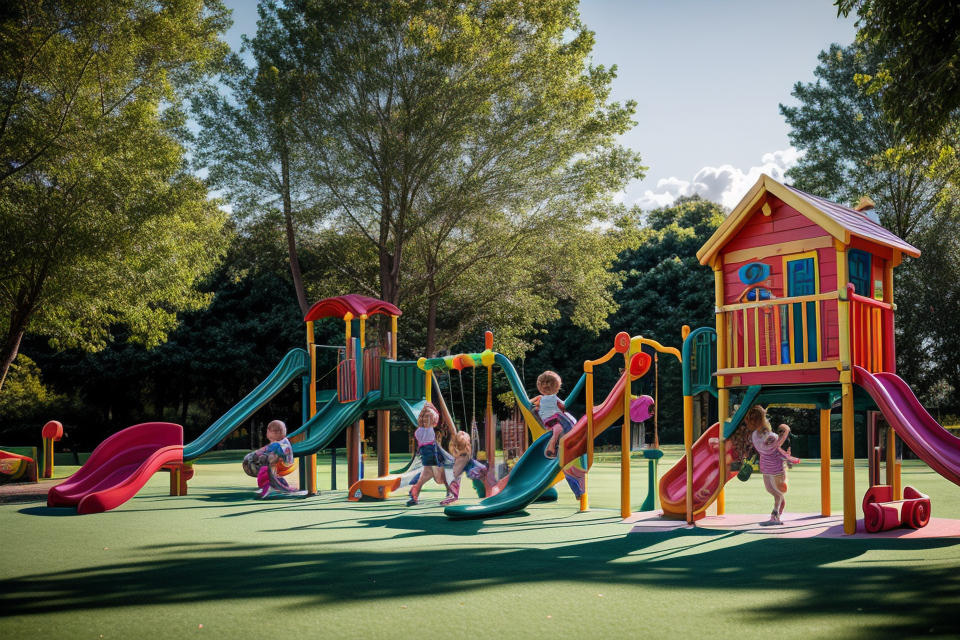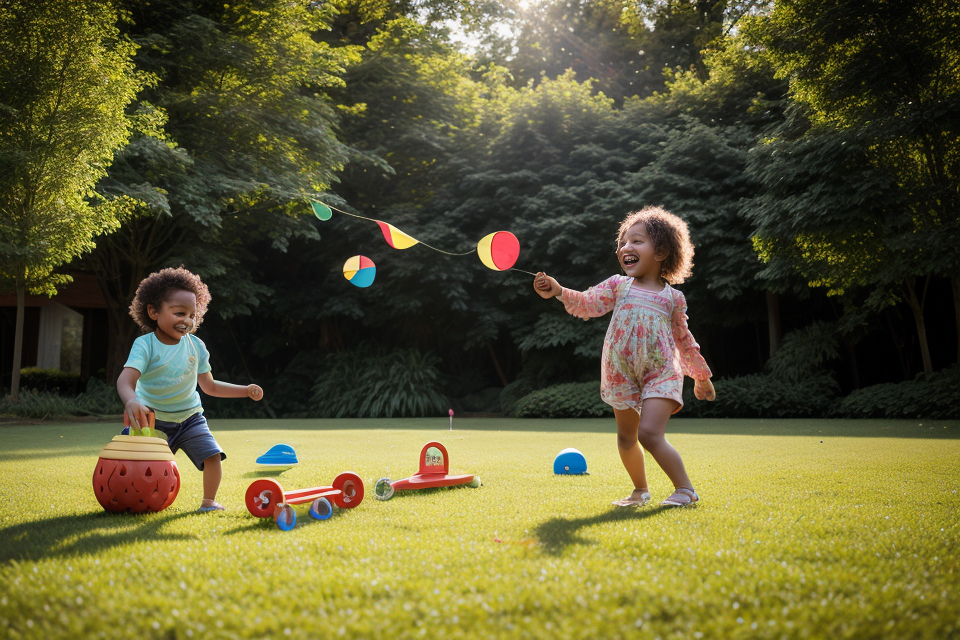Outdoor play is not just a fun activity for kids, but it’s also an essential part of their early childhood development. It helps them build social skills, improve their physical health, and boost their creativity and imagination. In this article, we’ll explore the many benefits of outdoor play and why it’s so important for young children. So, let’s dive in and discover why outdoor play is essential for early childhood development.
Importance of Outdoor Play in Early Childhood
Physical Development
Outdoor play is essential for the physical development of young children. It helps them build their gross motor skills, which are the skills that control the large muscles used for running, jumping, climbing, and balancing.
Some of the ways outdoor play contributes to physical development include:
- Improves gross motor skills: Outdoor play involves activities that require children to use their large muscles, such as climbing trees, running, and jumping. These activities help to develop the muscles and coordination needed for physical activities later in life.
- Enhances balance and coordination: Playing outdoors involves navigating different terrains and obstacles, which helps children develop their balance and coordination skills.
- Encourages physical activity: Outdoor play is a great way to encourage children to be physically active, which is important for their overall health and well-being. It also helps to prevent obesity and other health problems associated with a sedentary lifestyle.
Overall, outdoor play is crucial for the physical development of young children, as it helps them build the skills and confidence needed to participate in physical activities throughout their lives.
Cognitive Development
Outdoor play has a significant impact on the cognitive development of young children. Here are some ways it helps:
Boosts creativity and imagination
Children who engage in outdoor play are more likely to be creative and imaginative. Being in nature allows them to use their imagination and come up with new ideas. They can create their own games, build forts, and use their surroundings to inspire their play. This type of free play helps to develop their creativity and problem-solving skills.
Encourages exploration and discovery
Outdoor play also encourages exploration and discovery. Children are naturally curious and want to explore their environment. Being outside allows them to do this in a safe and controlled way. They can discover new things about the natural world and learn about different plants, animals, and weather patterns. This type of exploration helps to develop their sense of curiosity and desire to learn.
Develops problem-solving skills
Outdoor play also helps to develop problem-solving skills. Children are often faced with challenges when they are playing outside, such as figuring out how to climb a tree or build a shelter. These challenges help them to develop their problem-solving skills and think creatively to find solutions. They also learn how to work together with others to achieve a common goal, which helps to develop their social skills.
Overall, outdoor play is essential for cognitive development in early childhood. It helps to boost creativity and imagination, encourages exploration and discovery, and develops problem-solving skills. By providing children with opportunities to play outside, we can help them to reach their full potential and set them up for success in the future.
Emotional Development
Outdoor play has a significant impact on the emotional development of young children. It helps build their self-esteem and confidence, promotes social interaction and cooperation, and enhances emotional regulation and resilience.
Builds Self-Esteem and Confidence
Engaging in outdoor activities provides children with opportunities to explore and learn new skills, which can boost their self-esteem and confidence. As they achieve small successes, such as climbing a tree or building a sandcastle, their sense of competence and self-worth grows. This positive reinforcement encourages them to take on new challenges and helps them develop a strong sense of self.
Promotes Social Interaction and Cooperation
Outdoor play allows children to interact with others in a natural and spontaneous way, fostering the development of social skills and cooperation. Playing games, building forts, or simply sharing a picnic lunch with others teaches children how to communicate, negotiate, and empathize with others. These social experiences help them build friendships and learn how to work together towards a common goal.
Enhances Emotional Regulation and Resilience
Nature has a calming effect on the human mind, and outdoor play provides children with a space to explore and express their emotions. Whether it’s running through a field, splashing in a creek, or simply sitting quietly under a tree, outdoor environments offer a sense of peace and tranquility that can help children regulate their emotions. By experiencing a range of emotions in a safe and supportive environment, children learn how to cope with challenges and develop resilience.
Overall, outdoor play is essential for the emotional development of young children, providing them with opportunities to build self-esteem, develop social skills, and enhance emotional regulation and resilience. By engaging in outdoor activities, children can develop a strong sense of self and learn how to navigate the complex social world around them.
Benefits of Outdoor Play Equipment
Physical Benefits
- Encourages active play
Outdoor play equipment encourages children to engage in active play, which is essential for their physical development. It encourages them to run, jump, climb, and play games that require physical exertion. This type of play helps to develop their muscles, increase their endurance, and improve their overall physical fitness.
- Improves physical fitness
Playing outdoors also helps children to improve their physical fitness. When children engage in active play, they burn calories, build strength, and improve their cardiovascular health. Outdoor play equipment, such as swings, slides, and climbing frames, provide a fun way for children to exercise and improve their physical fitness.
- Develops coordination and balance
Outdoor play equipment also helps children to develop their coordination and balance. As they climb, swing, and balance on equipment, they learn to use their bodies in new ways and develop their fine and gross motor skills. This type of play helps to improve their spatial awareness, hand-eye coordination, and overall body control.
Cognitive Benefits
Outdoor play equipment provides a range of cognitive benefits that help children develop their brains and minds. These benefits include:
- Stimulates creativity and imagination: Outdoor play encourages children to use their imagination and creativity. They can create their own games, stories, and adventures, which helps them develop a sense of creativity and originality.
- Encourages exploration and discovery: Outdoor play provides opportunities for children to explore and discover new things. They can investigate the natural world, climb trees, and play in different environments, which helps them develop a sense of curiosity and wonder.
- Enhances problem-solving skills: Outdoor play involves challenges and obstacles that children must overcome. They may have to figure out how to climb a tall tree or how to build a fort, which helps them develop problem-solving skills and learn how to think critically.
These cognitive benefits of outdoor play are essential for early childhood development, as they help children develop the skills they need to succeed in school and in life. By encouraging outdoor play, parents and caregivers can help children develop their cognitive abilities and prepare them for a lifetime of learning and exploration.
Emotional Benefits
Outdoor play equipment provides numerous emotional benefits for young children, including building self-esteem and confidence, promoting social interaction and cooperation, and enhancing emotional regulation and resilience.
Building Self-Esteem and Confidence
Outdoor play allows children to explore and experiment with their environment, which can help build their self-esteem and confidence. When children successfully navigate new challenges and accomplish tasks, they develop a sense of competence and self-worth. This can lead to increased self-confidence and a positive self-image, which are essential for healthy emotional development.
Promoting Social Interaction and Cooperation
Outdoor play also provides opportunities for social interaction and cooperation, which are crucial for emotional development. Through play, children learn to communicate, share, and cooperate with others. They develop empathy and learn to understand others’ perspectives, which can help them form positive relationships and build a sense of community.
Enhancing Emotional Regulation and Resilience
Finally, outdoor play can help enhance emotional regulation and resilience in young children. Playing outdoors provides a natural outlet for expressing emotions and managing stress. Children can engage in physical activity, explore nature, and use their imagination, all of which can help them develop coping skills and resilience in the face of challenges.
Overall, outdoor play equipment provides numerous emotional benefits for young children, including building self-esteem and confidence, promoting social interaction and cooperation, and enhancing emotional regulation and resilience. By providing opportunities for outdoor play, parents and caregivers can help support healthy emotional development in children.
Safety Tips for Outdoor Play
Sun Safety
Outdoor play is an essential aspect of early childhood development, but it’s crucial to prioritize safety, especially when it comes to sun safety. Exposure to the sun’s ultraviolet (UV) rays can cause sunburn, premature aging, and even skin cancer, so it’s important to take the necessary precautions to protect young children from the harmful effects of the sun. Here are some tips to ensure sun safety during outdoor play:
- Dress appropriately for the weather: Loose-fitting clothing made of lightweight, light-colored materials such as cotton or linen are good choices. These fabrics allow air to circulate around the body, which helps to keep the child cool and protects their skin from the sun’s rays. Hats with wide brims are also a good choice, as they help to shade the face and neck from the sun.
- Use sunscreen and a hat: When dressing isn’t enough to protect the child’s skin from the sun, sunscreen can be applied to exposed areas of the skin. Look for a broad-spectrum sunscreen with an SPF of at least 30, which will protect against both UVA and UVB rays. Apply sunscreen liberally to all exposed areas of the skin, including the face, ears, and the back of the neck. Hats with a wide brim can also be used to protect the face and neck from the sun.
- Take frequent breaks to avoid overheating: When the weather is hot, it’s important to take frequent breaks from the sun. This will help to prevent overheating, which can cause dehydration, heat exhaustion, and even heatstroke. Look for shady areas or indoor play areas to take breaks, and encourage the child to drink plenty of water to stay hydrated.
By following these sun safety tips, parents can help to protect their children from the harmful effects of the sun while still allowing them to enjoy the benefits of outdoor play.
Safety Equipment
- Use appropriate safety equipment for the play equipment: This includes safety surfacing materials such as wood chips, sand, or rubber mulch that provide a soft landing spot in case of a fall. These materials should be properly installed and meet the recommended depth and coverage requirements for the specific equipment.
- Ensure the equipment is sturdy and well-maintained: Regular inspections should be conducted to check for any loose or damaged parts, and equipment should be repaired or replaced as needed. It is important to choose equipment that is appropriate for the age and abilities of the children using it.
- Supervise children at all times: An adult should be present to monitor the children’s play and ensure their safety. This includes being aware of any potential hazards, such as exposed nails or broken glass, and taking steps to address them. The adult should also be aware of the age and abilities of the children and set appropriate limits and expectations for their behavior.
Environmental Safety
- Avoid areas with hazards such as broken glass or sharp objects: It is important to be aware of one’s surroundings when engaging in outdoor play. Children should be taught to avoid areas that may have hazards such as broken glass or sharp objects that could cause injury.
- Teach children about potential hazards in the environment: As children are exploring the outdoors, it is important to educate them about potential hazards in the environment. For example, if there is a pond nearby, children should be taught about the dangers of playing near water and the importance of not swimming alone.
- Keep a close eye on children near bodies of water or steep drops: Children should always be supervised when engaging in outdoor play, especially near bodies of water or steep drops. Adults should keep a close eye on children to ensure their safety and intervene if necessary.
Outdoor Play Ideas for Early Childhood
Nature Walks
Nature walks are a great way to encourage outdoor play in early childhood. They provide children with the opportunity to explore the natural environment, observe and identify plants and animals, and collect natural items such as leaves or rocks.
During a nature walk, children can:
- Develop their senses by observing and touching different natural items
- Enhance their knowledge of the natural world and learn about different plants and animals
- Improve their gross motor skills by walking, running, and climbing on rocks or logs
- Increase their creativity by using natural items to create art or play games
- Learn to appreciate the beauty of nature and develop a sense of stewardship for the environment
Nature walks can be done in any natural environment, such as a park, a forest, or a beach. They can be short and simple, or longer and more adventurous, depending on the child’s age and abilities.
It is important for adults to supervise nature walks and ensure that children are safe. They should also encourage children to respect the environment and not disturb or damage any natural habitats.
Overall, nature walks are a fun and educational way to encourage outdoor play in early childhood and promote a lifelong love of nature.
Gardening
Gardening is a fantastic outdoor activity for young children that offers numerous benefits for their early childhood development. Here are some reasons why gardening is a great activity for young children:
Plant and care for a small garden
Young children can learn about planting and caring for a small garden, which can help them develop a sense of responsibility and nurturing. They can learn about the different stages of plant growth, from planting the seeds to watching them sprout and grow into full-grown plants. This hands-on experience can also teach children about the importance of patience and persistence.
Learn about different types of plants and their needs
Gardening is an excellent way for young children to learn about different types of plants and their needs. They can learn about the different types of soil, sunlight, and water requirements for various plants. This knowledge can help them understand how to care for their plants and ensure they grow healthy and strong.
Harvest and eat produce
One of the most rewarding aspects of gardening for young children is the ability to harvest and eat the produce they grow. This activity can help them understand the connection between the food they eat and the process of growing it. It can also encourage them to try new foods and develop a healthy relationship with food.
Overall, gardening is a fantastic outdoor activity for young children that offers numerous benefits for their early childhood development. It can help them develop a sense of responsibility, learn about different types of plants and their needs, and even encourage them to try new foods.
Outdoor Games
Tag
- A classic game that involves running and hiding
- Encourages physical activity and social interaction
- Develops cognitive skills such as memory and strategic thinking
Hide-and-Seek
- A game that promotes creativity and imagination
- Encourages problem-solving skills as children figure out how to hide effectively
- Develops cognitive skills such as memory and spatial awareness
Creating New Games
- Allows for endless possibilities for creativity and imagination
- Encourages children to think outside the box and use their imagination
- Develops cognitive skills such as creativity and critical thinking
Sports
- Playing sports such as soccer or basketball provides opportunities for physical activity and teamwork
- Encourages children to learn and follow rules, as well as to work together as a team
- Develops physical skills such as coordination and balance, as well as cognitive skills such as decision-making and strategy
Overall, outdoor games provide children with a chance to engage in physical activity, develop cognitive skills, and encourage creativity and imagination. They also offer opportunities for social interaction and teamwork, which are important for early childhood development.
Arts and Crafts
When it comes to outdoor play ideas for early childhood, arts and crafts activities are a great way to encourage creativity and imagination while also connecting children with nature. Here are some specific activities that can be done in the great outdoors:
- Create nature-inspired art using natural materials: Take some paper, crayons, and scissors and have children collect leaves, flowers, and other natural materials to create their own artwork. This activity encourages children to observe and appreciate the beauty of nature while also expressing themselves creatively.
- Create a scavenger hunt or treasure hunt: Hide small items such as rocks, feathers, or shells for children to find. This activity promotes exploration, problem-solving, and the development of observational skills.
- Have a picnic or outdoor snack: Pack a picnic lunch or snacks and head to a nearby park or playground. This activity encourages social interaction, sharing, and the development of fine motor skills as children learn to use utensils and eat without making a mess.
These activities not only provide children with a fun and engaging way to spend time outdoors but also promote important skills such as creativity, problem-solving, and social interaction. By incorporating arts and crafts into outdoor play, children can develop a deeper appreciation for nature and the world around them.
FAQs
1. Why is outdoor play important for early childhood development?
Outdoor play is essential for early childhood development because it provides children with opportunities to explore and learn about the natural world, develop their senses, and enhance their physical, social, and emotional development. Being outdoors exposes children to a variety of stimuli that help them build their cognitive, language, and motor skills. It also helps them develop a sense of appreciation for the environment and fosters a connection to nature.
2. What are the benefits of outdoor play for young children?
The benefits of outdoor play for young children are numerous. It helps them develop their gross and fine motor skills, balance, coordination, and endurance. It also enhances their social skills, encourages creativity and imagination, and supports cognitive development by promoting problem-solving and critical thinking. In addition, outdoor play can help reduce stress and anxiety, boost self-esteem, and promote a sense of adventure and curiosity.
3. What are some examples of outdoor activities that are beneficial for young children?
There are many outdoor activities that are beneficial for young children, including hiking, walking, running, climbing, balancing, digging, planting, and playing in sand or water. Playing with natural materials such as sticks, rocks, and leaves can also be beneficial. Sports and team games can help develop social skills and cooperation. Visits to parks, zoos, and museums can provide opportunities for learning about the natural world and cultural experiences.
4. How much outdoor play is enough for young children?
Young children need a balance of indoor and outdoor play to develop in all areas. The American Academy of Pediatrics recommends that children should have at least an hour of outdoor play per day, with more if possible. However, the amount of outdoor play that is appropriate for each child will depend on their age, physical abilities, and interests.
5. Is outdoor play safe for young children?
Outdoor play can be safe for young children if proper precautions are taken. Parents and caregivers should ensure that children are supervised at all times, especially near water, heights, and other hazards. Children should wear appropriate clothing and footwear for the weather and activities, and should be taught how to use any equipment safely. It is also important to be aware of any potential hazards in the environment, such as poisonous plants or insects.



